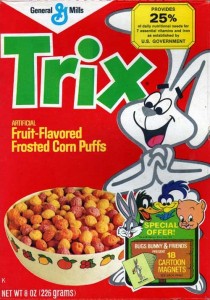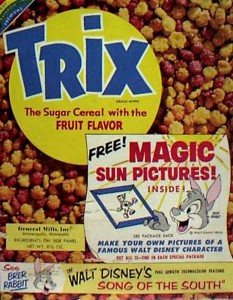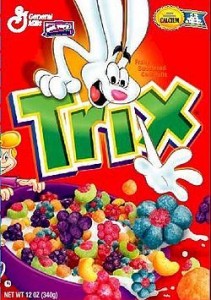(This is the last post in a series of I am doing entitled “Why It Doesn’t Make Economic Sense to Run Education like a Business.”)
Trix or Augustine? Which would be a better model for how we think about education? I’m afraid that we too often approach education as if we were buying breakfast cereal (if we are students) or trying to sell breakfast cereal (if we are in charge of education).
Think about this. We don’t run our family economies like a business. And we shouldn’t. (“Justin, that’s the third time in the last month that you forgot to clear the dishes from the table. This has really cut into our household productivity, so we’re going to have to let you go. But chin up, buddy. I’m sure it won’t be long before you land on your feet with another set of parents somewhere who are in need of a nine-year old boy.”)
We don’t run our church economies like a business. (Well, most churches do not). And we shouldn’t. (“Here at Bob’s Discount Baptist Church, you get two sermons on John 3:16 for the price of one offering! But wait, there’s more! Just present this coupon to the usher and Pastor Bob will take an additional 25% off of your next altar call!”)
We should not run our educational economies like a business, either. The market has its place, but it will not take care of the challenges of education, just like it won’t take care of the challenges of parenting or of ministry.
And yes, there is a proper role for government, but government will not solve these problems, either. (Insert your own joke here). I say this because Americans tend to react to non-individualized problems by turning either to the market or to the government. There are more than two options out there, folks.
I’m afraid, though, that I don’t have a good model for how the economics of education should work. It would be great if a really smart economist, who understood the ways that humans behave when confronted with the dynamics of learning, would work all of this out.
My primary concern, though, is not exactly the question of how to fund education. My bigger concern is that, socialized as we all are in deep patterns of consumerism, we carry a consumer mindset to so many aspects of our life where they don’t belong. (See “Cereal, Trix.”).
And it is in this realm where we can find a much better model: Augustine.
Now, I am not an expert in Augustine. His thought can get quite complicated, but there are real riches to be found there, especially for the Christian faith. Let me summarize and over-simplify a huge body of work here by saying that Augustine wrote that the best education is built upon gratitude, sacrifice, humility, love and true delight. These are qualities that take us in very different directions from consumerism.
Let’s unpack these a bit.
Gratitude. It sounds strange to say that we should be thankful for a college education when tuition costs so much. But you can’t buy an education. A college education is actually a gift from God, in an odd sort of way. Not everybody has the ability to do college-level work. Some people are more “gifted” intellectually than others. Get it? Furthermore, there are millions of people in this world who have the gifts to do college-level work, but do not have the opportunities to get a quality university education. Those of us who have been given these opportunities should be grateful for them. If we are not grateful for a college education we will feel entitled; we will think we deserve our educational opportunities and the benefits that come from it. And entitlement is not a good thing, is it?
Sacrifice. Ah, yes, a good education requires one to work. That means sacrificing short-term desires like Facebook, video games, shopping, eating, hanging out, movies, or all that other stuff for the long-term good of one’s education. Sacrifice is hard; consumerism is not. Barlow’s Law, baby.
Humility. The best education provokes us to admit that we do not have everything figured out. The best education pushes us to respectfully consider the ideas of others. The best education requires that we submit to the methodologies, theories and practices of an academic discipline. The best education demands that we change our understanding, beliefs and practices when confronted with our own misperceptions, errors, or faulty processes. Those are all elements of humility. Consumerism, by contrast, puts us in charge of buying what we want. Not much humility in that.
Love. The best education helps us to better love God and love others. In fact, every academic discipline, properly understood, can and should be about loving God and/or others in some way. Education should direct us to God’s purposes for the world and a deep concern for the common good. It is in these highest biblical commands to love that we truly find life. Much of consumerism, as so many advertisements declare, is all about me. And that is a distinctly un-biblical sort of way of thinking and desiring.
True delight. When all of these things come together, we discover the true delight in learning. We are grateful for our learning, we don’t mind the sacrifice, we embody humility and we love more completely. Meanwhile, it’s rather odd that the happiness I experience when I buy my new iPhone lasts for….two weeks? And the thrill is definitely gone when the newest iPhone hits the market. Consumerism fools us into thinking we are finding true delight, but it fails to deliver.
Augustine’s principles do not just apply to students. Teachers, professors, administrators, and anyone involved in or concerned with education should give his principles careful consideration as well. I myself need to be reminded of these points regularly.






